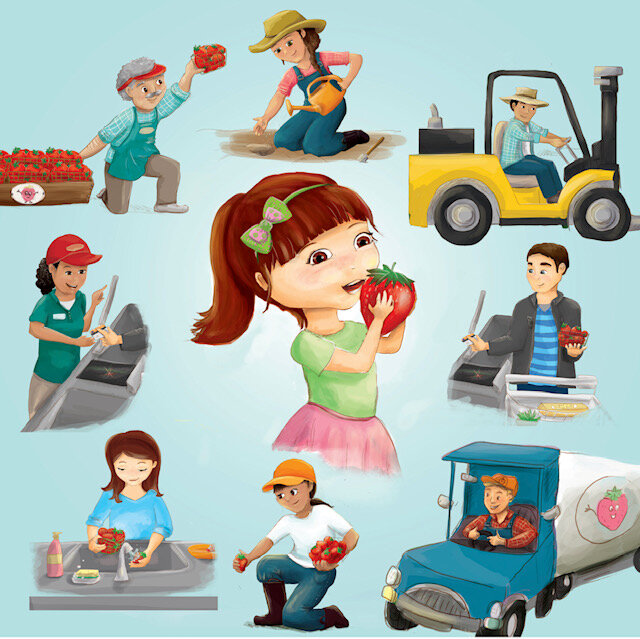There has been a lot of talk lately about essential workers. Many of us ask, “What exactly does essential mean?” and “Who are these essential workers?”
The dictionary defines essential as necessary – something we need, and that we can’t do without. Food is essential – we can’t live without food.
While many people help us, essential workers are the people who help us get the essentials of life – the things we can’t live without, and things we can’t get for ourselves. In other words, we can’t survive without essential workers.
Essential Workers:
Bring us food and water
Pick our fruits and vegetables
Pack our food and load it onto trucks
Transport our favorite things from factories to stores
Stock our groceries
Ring up and bag our purchases
Keep our electricity and water running
Remove our garbage
Fix our toilets and plug our leaks
Connect our internet and keep our phones working
Deliver our mail and bring us packages
Protect us
Keep us healthy
Essential workers work hard. They carry heavy boxes, drive for long stretches of time, and work long hours. They work in the hottest heat and coldest cold, through rain, snow, sleet, slush, strong winds, and thunderstorms. They operate large machines and use sophisticated technology.
They continue working when the rest of us stop – on weekends, holidays, early in the morning, and all through the night, during hurricanes, blizzards, and even during a pandemic. When the world stopped, the essential workers kept going to provide our needs. They remained at the frontlines and exposed themselves to risk so we didn’t have to. We stayed safe and secure at home.
Essential workers do their jobs behind the scenes and we don’t often see them. They work in fields, farms, warehouses, factories, and power plants where they pick our fruits and vegetables, pack and ship our merchandise, and manufacture our necessities. Essential workers make our world run efficiently and keep our communities safe and healthy.
WE IS THE NEW ME
During the recent pandemic, we learned how valuable essential workers are. This new awareness and appreciation help us realize how interconnected we all are and how much we depend on each other for what we need. We all help and serve each other. No one can do everything on their own.
We can create a better future with this level of awareness. With the knowledge that we are all interconnected, we can evolve from the current competitive mindset to the collaborative mindset of the 21st Century.
We are happiest when we help and add value to other people’s lives – when we make things better and easier for each other. This creates a WIN-WIN mentality which is the basis for the entrepreneurship of the 21st Century Economy.
Gratitude and appreciation are the foundation for healthy interactions and creating a 21st Century community. When we appreciate what other people give us and do for us, we look for ways that we can give, and serve others. The practice of appreciation and gratitude, with awareness and acknowledgment of what we contribute, improves our relationships. The ways in which we serve each other unites us in a global community.
Imagine what we could accomplish in a world in which we all share our skills, talents, resources, and express our unique gifts, to support and bring out the best in each other. The more we connect, partner, and network with people, the more opportunities for success we create. We will fulfill our individual and global destiny.
We have been gifted with an historical opportunity to cultivate a mindset of appreciation for the people and processes that sustain, support and nourish us.
Express gratitude to essential workers. Make this an everyday practice, don’t just wait for a pandemic.
The ordinary is extraordinary. We experience life more deeply when we realize that everything we eat, wear, and play with, involves many people and processes
We are all heroes. Find ways to become a hero in other people’s lives. What are your skills and talents that you can share? What gifts can you give? How can you help others and bring value to their lives?
Educate children and provide them with resources to learn about the importance of community:
Read books about essential workers
Read books about gratitude
Discuss how essential workers impact our lives
Sing Thank You songs
Play with Essential Worker puppets and dress up with props
Write Thank You letters and create Thank You gifts
Resources: Books, Songs, Videos
Thank You for the Strawberries, by Riki Lax
How Did that Get in My Lunchbox?, by Chris Butterworth
Before We Eat From Farm to Table, by Pat Brisson
The Thank You Book, by Mo Willems
An Awesome Book of Thanks, by Dallas Clayton
Thank You, Omu, by Oge Mora
Thank You, World, by Alice B. McGinty
Thankful, by Eileen Spinelli
Trashy Town, by Andrea Zimmerman and Dan Clamesha
What if There Were No Teachers? by Caron Chandler Loveless
When I Grow Up, by Al Yankovic
I Want to be a Doctor, by Laura Driscoll
Night Job, by Karen Hesse

